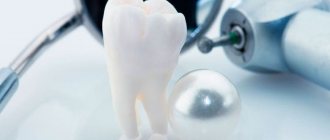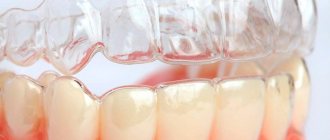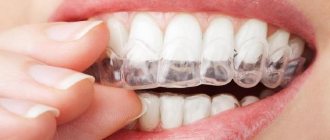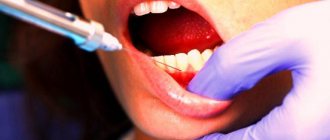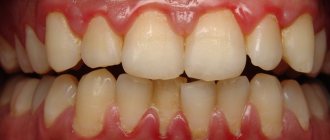Consultation with a doctor A pregnant woman is bombarded with myths from all sides about what can and cannot be done during this period. These superstitions even affect dental procedures. Pregnant women, listening to outside advice, refuse pain relief while undergoing gum treatment and endure pain, or try to avoid visiting the dentist altogether. But often such myths are completely inconsistent with modern reality. The article will help you figure out whether it is possible to treat teeth during pregnancy, remove them, take x-rays, give painkillers, or perform prosthetics.
Is it possible to treat teeth during pregnancy?
Most dentists will answer that teeth can not only be treated during pregnancy, but should also be treated if such a need arises. After all, caries, gum inflammation and other problems cause not only discomfort, but can also provoke pregnancy complications.
The period of bearing a baby is divided into three trimesters. Let's figure out when you can treat teeth during pregnancy, what period is the safest for such manipulations.
In the first trimester (weeks 1-12), the formation of the baby’s organs occurs, while the placenta, the main barrier, is not yet fully formed. This period is considered the most vulnerable, since any adverse external influence can lead to malformations and premature termination of pregnancy. In the first trimester, if necessary, simple treatment is usually carried out; more complex procedures are postponed to the second trimester, but depending on the situation, exceptions are possible.
The second trimester (13-25 weeks) is considered the most favorable for dental treatment during pregnancy. During this period, toxicosis no longer bothers the expectant mother and it will not be difficult for her to remain in one position for a long time.
In the third trimester (26-40 weeks), treatment is mainly carried out for emergency reasons. This is due to the following features of this period:
- a woman should not remain in a supine position for a long time due to compression of the inferior vena cava and aorta, so all manipulations are performed in a short time, or on the right side;
- the risk of premature birth increases.
It is important to understand that if a tooth hurts during pregnancy, you should not put off visiting a doctor. Pain provokes complex biochemical processes in the body, causing enormous stress that can harm mother and baby. Regardless of the trimester, the doctor will provide assistance that will be as gentle and safe as possible.
Content:
- Is it possible to treat pulpitis in pregnant women?
- Features of the fight against pulpitis during pregnancy
- How to avoid pulpitis during pregnancy
- Risks to the fetus if pulpitis is not treated
Pulpitis is a disease in which the internal tissues of the tooth - the pulp - become inflamed.
It leads to severe pain symptoms. Toothache becomes especially severe at night. As the body tries to fight off the infection, your body temperature may rise. If pulpitis occurs in a pregnant woman, you should not hesitate to seek qualified dental care. The doctor can help the patient in an “interesting situation” without harming the health of the fetus. Under no circumstances should a woman tolerate the symptoms of the disease. Gradually they may disappear, but this does not mean that the inflammation has subsided. Simply, pulpitis will turn into a chronic form, which is very insidious.
Do teeth deteriorate during pregnancy?
Hormonal and physiological changes that occur during pregnancy can aggravate the course of some dental diseases. For this reason, it is recommended to carry out a complete sanitation of the oral cavity at the planning stage. If your teeth were healthy before pregnancy, then after, if you follow all the recommendations (proper hygiene, consuming enough microelements), they will remain the same. Pregnancy will not affect their condition in any way.
The main cause of caries and gum inflammation is dental plaque. Therefore, the risk of their development directly depends on the quality of personal and professional oral hygiene, which should not be neglected while bearing a child.
It is not uncommon for a wisdom tooth to make itself felt during pregnancy. The gums above it begin to ache, making it difficult to eat. It is also important to think about this at the planning stage - visit the dentist, if necessary, excision of the mucous membrane over the wisdom teeth, or it may be necessary to remove the wisdom tooth.
Other reasons
Other reasons that can cause severe pain after nerve removal include:
- allergic reactions to the use of materials during treatment, in addition to pain, itching, swelling;
- tissue injury, gum damage (accompanied by inflammatory processes, swelling, pain);
- neuralgia (damage to the trigeminal nerve during treatment can cause sharp, severe pain).
How to eliminate pain after depulpation?
Doctors recommend a number of preventive measures that can help prevent the development of discomfort after nerve removal:
- immediately after depulpation, you should follow the doctor’s advice, do not remove the cotton swab in the first twenty minutes;
- the first day you should refrain from solid, cold or hot food, smoking;
- The mouth should be rinsed at the frequency specified by the doctor; during the first days, do not disturb the sore area with a brush while brushing your teeth;
- for three days, rinse your mouth with neutral antiseptic agents at least twice a day.
Doctor's recommendations
To prevent complications and pain, the patient must adhere to the doctor’s recommendations. On the first day after treatment, you should rinse your mouth with a soda solution with the addition of a small amount of iodine. You can alleviate the condition by taking painkillers and avoiding eating solid food, hot or cold, on the first day. It is also recommended to refrain from physical activity.
You can alleviate the condition using the following methods:
- Propolis. To eliminate pain, you need to apply a small piece of propolis to the painful area, the discomfort quickly passes, the product has a disinfecting, anti-inflammatory effect.
- Vodka or cognac. If there is sharp, ongoing pain after removal, you can use rinses with cognac or regular vodka. The pain goes away quickly, alcohol has a disinfecting effect, eliminating infection of the diseased area.
- Rinse with vegetable oil. This remedy calms and alleviates the condition. You need to hold a small amount of the product in your mouth; you should spit out the oil after it turns whitish.
- Salo. You can relieve pain by applying it to the wound after removing the nerve.
- Ice compresses. An effective way to relieve pain and swelling is a crushed ice compress. You can make such compresses yourself or buy special ones at the pharmacy. They are applied to the cheek opposite the painful area. Instead of compresses, you can use an ice cube, holding it near the painful tooth.
When is it necessary to see a doctor?
After nerve removal, the patient should monitor the condition of the tissue. If the pain does not go away, you should consult a doctor who will conduct an examination and prescribe treatment. Also, contacting the clinic is required in the following cases:
- tissue swelling develops, which does not go away and intensifies over time;
- the throat feels sore, chewing and swallowing are difficult;
- purulent discharge appears;
- an unpleasant odor appears from the mouth.
Self-treatment in this case will only worsen the situation. If you do not consult a doctor, complications are likely to develop, including granulomas, cysts, and other dangerous diseases.
Is it possible to do dental x-rays?
The most common misconception is that dental x-rays are prohibited during pregnancy. X-rays can indeed have a negative effect on the child, therefore such studies of the lungs and other organs are contraindicated during this period. But with dental x-rays, the risks are minimal, since:
- the emitted waves are so weak that they do not affect the baby;
- the rays are directed exclusively to the area under study;
- The chest and stomach are covered with a protective lead apron.
Under such conditions, the penetration of radiation through the tissues of the mother to the child is excluded.
Some clinics use dental microscopes for diagnostics instead of X-rays, the contraindications to their use are minimal.
Filling canals with hot gutta-percha
Dentists and manufacturers of dental equipment are constantly improving technologies for passing through canals, their disinfection and filling.
In the NORD DENTAL clinic, for filling complex canals, the method of vertical condensation (compaction) of hot gutta-percha is used using equipment from the German company VDW GmbH.
Today this is the most effective technology for “sealed” channels of complex shapes.
Come to the NORD DENTAL clinic for quality dental treatment.
Is it possible to give painkillers to pregnant women?
Dental anesthesia during pregnancy is not contraindicated; on the contrary, it helps reduce pain and stress, which negatively affect the condition of mother and baby.
Modern anesthetics based on articaine are absolutely safe during pregnancy, because:
- The drug is injected exclusively into the area of intended intervention, and its entire volume is distributed there.
- The drug does not enter the bloodstream and deep tissues, so its penetration through the placenta to the baby is impossible.
The newest drugs for pain relief also reduce the content of vasoconstrictor components. The child will not experience any discomfort or lack of nutrients during the mother’s treatment.
Incorrectly performed treatment
Poor quality materials and violation of treatment technology also cause pain. Reasons for such complications include:
- the channels are not completely cleaned;
- the nerve was partially removed;
- cavities remain under the filling material, leading to tissue destruction and the development of inflammatory processes;
- During filling, the material is moved beyond the apex of the root canal;
- The doctor did not notice any branches or lateral additional channels during treatment.
Removal and prosthetics of teeth
Tooth extraction during pregnancy is not prohibited, but the operation is performed only in cases of urgent need. Each case is considered by a doctor individually. To numb a tooth after extraction, only safe medications are used during pregnancy.
Removal of nerves in a tooth during pregnancy is carried out in case of deep caries, when the infection has already penetrated the root canal and affected the pulp; otherwise, they try to cure the nerve using conservative methods.
Prosthetics are possible, but also with limitations. It is possible to install crowns, but it is better to postpone the implantation of an artificial implant. This is due to the fact that:
- the implantation process is quite complicated and requires a lot of effort;
- in the postoperative period it is necessary to take strong painkillers and antibiotics, which are not safe for the child;
- During the period of bearing a child, there is a high risk of rejection of foreign material.
It is not only possible, but also necessary to treat teeth while carrying a child. Timely treatment will keep the mother healthy and prevent the possibility of infection of the fetus. Modern drugs and anesthetics, developed specifically for pregnant women, not only do not have a toxic effect, but also make the treatment as painless and comfortable as possible.
Before visiting the clinic, you can consult with friends who have undergone similar procedures, find out how teeth were treated during pregnancy, and which dentist.
The experience of other people will help you cope with fear. When visiting a doctor, it is important to notify about your condition. The doctor's consultation
WHAT ABOUT ARSENIC
Arsenic is an extremely dangerous toxic substance that is completely unacceptable during pregnancy. In Soviet times, the use of poison was the only method of removing a nerve - a paste containing a small amount of arsenic was placed into the tooth cavity and covered with a temporary filling. With this “stuffing” it was possible to walk for up to two days until the nerve died. After this, a second visit to the dentist was required, during which the no longer living nerve was removed. Fortunately, in the modern world this method is practically not used, and the entire procedure is performed during one appointment and takes approximately 30-40 minutes.
After removal, the canals are filled, and the choice of materials should take into account your position. Dentists often recommend placing a temporary filling and replacing it with a permanent one after the birth of the child.
Important! If the toothache is unbearable, you will have to take an analgesic. During pregnancy, only paracetamol-based drugs are considered relatively safe, but they also have contraindications, so you should try to take the minimum permissible dose.
Is it painful to remove a nerve from a tooth?
Modern dentistry has the widest possibilities and powerful universal anesthesia. Thanks to this, removal of the flock nerve is a painless procedure that is carried out during the visit. The only discomfort that the patient may feel concerns the injection into the gum. This can also be easily avoided by applying anesthesia, after which inserting a needle will not cause any discomfort.
Pain may occur in rare cases for one of the following reasons:
- Individual characteristics of the path of nerves, which is why standard techniques provide insufficient pain relief.
- Taking painkillers the day before by the patient, in particular from the group of non-steroidal anti-inflammatory drugs (NSAIDs), may reduce the effectiveness of anesthesia.
- The patient took alcohol before visiting the doctor.
- The patient belongs to the 2% of all people with immunity to anesthetics.
The solution to the problem in each case is the same - repeated anesthesia.
